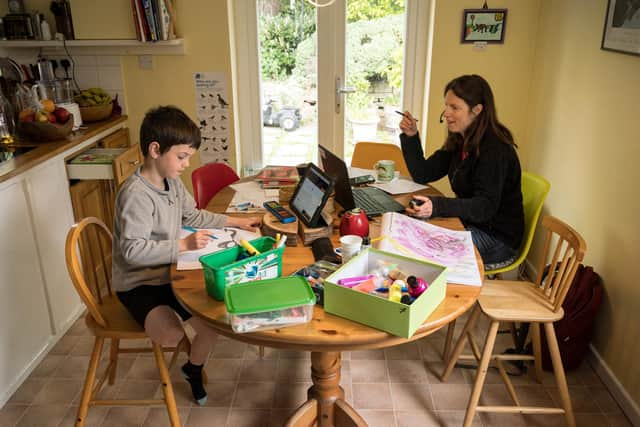Why working from home should be so last year once Omicron threat subsides – Susan Dalgety
and live on Freeview channel 276
My desk is my lap. I take frequent breaks for coffee, snacks and a gossip with my co-worker (my husband), and while my view is of the Firth of Forth, I have worked on projects in Malawi, Ukraine and Bangladesh.
This solitary routine suits me, up to a point. I can focus on my writing and research without fear of interruption. I have mastered the art of Zoom meetings, so my colleagues in Malawi and I can chat about fashion as easily as we can plan a seminar.
Advertisement
Hide AdAdvertisement
Hide AdAnd I don’t need to wear formal clothes. I still have some work dresses, bought just before the virus exploded, hanging forlornly in my wardrobe, their price tags mocking me.
But I miss people. The casual chats that happen before a meeting, the terrible jokes people use to break the ice, even the 44 bus journey into the city centre.
Work is about much more than answering the phone or writing a proposal. It is about the interaction with colleagues and customers. It is about providing a service, whether you are a civil servant in St Andrew’s House or call centre staff at the South Gyle. Long term, you cannot do these jobs properly from your sofa.
I was delighted to read therefore that Edinburgh’s office market remains buoyant, with 90 per cent of city centre space let, despite the disruption of the last two years. This is good news, and not just for those organisations keen to get back to near-normal working.


Advertisement
Hide AdAdvertisement
Hide AdOur city centre would die a slow death if everyone who could worked from home. We can already see the impact of home working on coffee shops and bars, with some forced to close and others complaining of reduced custom.
And retail suffers too. Footfall to Scotland’s shops dropped by nearly a quarter – 23 per cent – last month, usually the busiest time of the year, as Omicron forced people back into their home offices.
I can understand the lure of permanent home working, particularly if you have a young family. No more jam-packed bus journeys after dropping the kids off at breakfast club. Lunch is a leisurely snack in the comfort of your own home, instead of a Meal Deal grabbed between meetings. The end of the working day requires a commute of a few metres.
But we are social animals, and workplaces are social organisations. They thrive best when people are together, learning from each other. And home working divides society between those be able to earn a living from the comfort of their sitting room, and essential staff, like construction and retail workers, who cannot work from home, no matter how much they may yearn for it.
Advertisement
Hide AdAdvertisement
Hide AdEdinburgh was changing before the pandemic struck, as the digital economy grows. But if we want our city to thrive, we need to encourage people to get out of their joggers and back into business suits, or at least smart causal wear, once the Omicron threat dissipates. Working from home is so last year.
A message from the Editor:
Thank you for reading this article. We're more reliant on your support than ever as the shift in consumer habits brought about by coronavirus impacts our advertisers.
If you haven't already, please consider supporting our trusted, fact-checked journalism by taking out a digital subscription.
Comment Guidelines
National World encourages reader discussion on our stories. User feedback, insights and back-and-forth exchanges add a rich layer of context to reporting. Please review our Community Guidelines before commenting.
